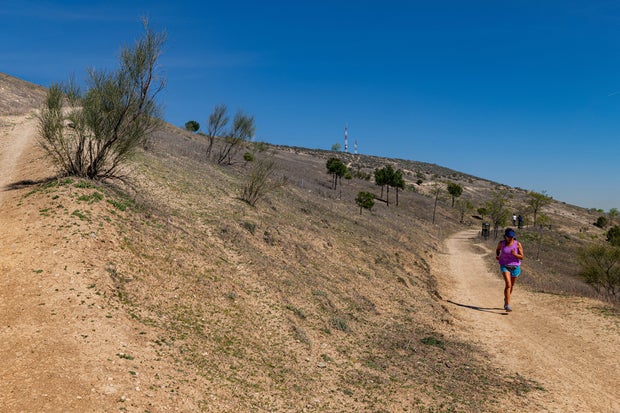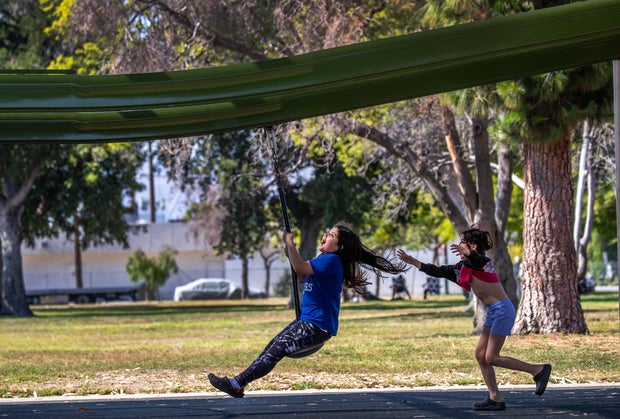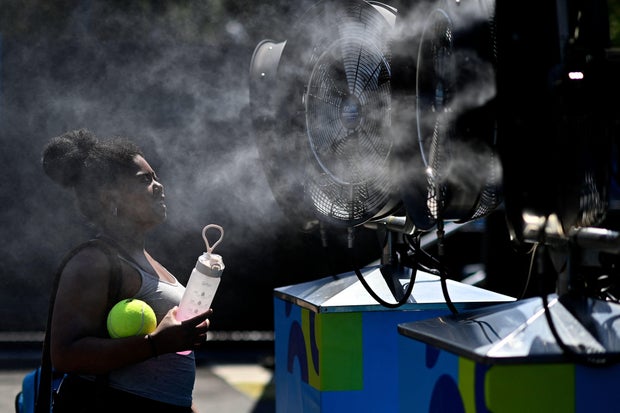The days of lacing up your sneakers for a midday run during a summer may be coming to an end. Extreme heat is scorching cities across the world, an issue that is expected to only persist and worsen as time goes on – and experts say it will likely cause a “massive shift” in outdoor sports as we know them.
People in the Southwest U.S. and elsewhere in the world have been facing brutal temperatures for weeks on end. This year’s heat waves are driven in part by the emergence of El Niño, a natural climate phenomenon that occurs when the Pacific Ocean experiences “warmer-than-average” surface temperatures.
But the planet as a whole is also continuously getting warmer as greenhouse gases trap heat in the atmosphere – a problem that experts have warned will make heat waves like those currently being faced a more regular issue in the years to come. As global temperatures increase, those heat waves, as well as extreme storms, drought and other weather events, will become even worse.
And for those who enjoy spending time in the sunshine in the warmer months, this could be the recipe for disaster.
“I’ll be honest with you. The temperatures we have been experiencing this summer, especially what we’re going to see every summer, I think for a lot of folks it’ll require a massive shift where for at least maybe a month or two a year, you’re going to have to shift your workout to something indoors,” Bharat Venkat, an associate professor at the University of California Los Angeles and director of the UCLA Heat Lab, told CBS News.
“I think we’re really going to see that especially something like running during those hot summer months during these heat waves, is just going to be a bad idea.”
Bloomberg
Why is extreme heat dangerous?
Your body is constantly trying to regulate its temperature, which is why you shiver when you’re cold and sweat when it’s hot. But when it becomes too hot outside, and then you exercise in that heat, Venkat explained that you’re essentially “confronting heat from both sides of the equation.”
“The more intense workout that you’re doing, the more heat your body is producing. And so you’re really making it very difficult for your body to cool down or stay within safe parameters.”
Those parameters are different for everyone, depending on age, overall health, hydration levels and more. But as temperatures and humidity increase, pretty much everyone will feel an impact regardless of other factors.
And when you’re body becomes overheated, it can be dangerous, if not deadly. Heat-related illnesses send roughly 67,500 people in the U.S. to the emergency room every year and kill roughly 700, according to the CDC.
In triple-digit temperatures, like what many cities in Arizona and Texas have been facing, outdoor recreational activities, including running, cycling, hiking and for some, even walking, shouldn’t be happening, Venkat said.
“You should probably at best try to get up as early as possible and work out really early in the morning or really late,” he said. “But in general, I would avoid outdoor exercise during these moments of extreme heat.”
Bodies can acclimate to different environments over time, but he explained that “there’s a real limit to that.”
“The dangers are real when it gets that hot and your best option, if at all possible, is to bring your exercise inside.”
Allen J. Schaben
Extreme heat is causing “behavior changes”
But for many people, summer is primetime for such activities. For even amateur runners, autumn is the time for some of the best races that require months of training ahead of time. There are also numerous leagues for both adults and children during the summer, as well as summer camps that often include outdoor activities, all of which can be affected.
Allison Colman, senior director of programs for the National Recreation and Park Association, told CBS News her organization has seen “behavior changes” from outdoor enthusiasts who are trying to do just that. Many people, she said, are asking for access to outdoor rec spaces earlier in the morning or later at night, when temperatures are cooler.
Areas experiencing poor air quality, like much of the Northeast and Midwest U.S. have due to the ongoing Canadian wildfires, have also seen their summer camp and youth sports programs impacted. Camps and games have both been postponed if not canceled, Colman said.
“Rising temperatures and poor air quality and other climate change related events – extreme precipitation and flooding and things like that – it could create additional barriers to being able to be physically active in the communities where people live, learn, work and play,” she said. “And that, of course, can create some disparities.”
More affluent communities, she said, will likely have better access to gyms and indoor spaces for recreational activities. They also are more likely to have more trees or structures with shaded areas.
“Under-resourced communities might not have those same opportunities or face additional barriers to being able to access them,” she said. “…A lot of the solutions that are out there…all of those things come at a cost. And local parks and recreation departments…they are typically under-invested, and many of them have backlogs of maintenance and need additional resources to be able to make these changes.”
MANAN VATSYAYANA/AFP via Getty Images
As heat season extends, sports seasons will change
CBS News reached out to New York Road Runners and the Boston Athletic Association for an interview. While both organizations, which host the New York City Marathon and Boston Marathon, respectively, declined, they both provided information about how they are attempting to help runners adapt to higher heat and humidity.
The New York Road Runners organization has guidance on its website urging people to “respect your limits” when the heat and humidity are particularly brutal. Along with standard health guidance to drink enough water, know the signs of illness and wear sun protection, the group also says that it can take 10 days to two weeks for the body to acclimate to higher temperatures.
Last year, a 32-year-old runner died after finishing the Brooklyn Half Marathon, a NYRR event, on a day that saw temperatures in the low 60s to high 70s with high humidity. The city was under a heat advisory at the time, and more than a dozen other people had to be taken to the hospital during the event.
The New York Road Runners have additionally implemented a color-coded alert level system that is updated throughout races to warn people of anywhere from “good” to “extreme” weather conditions, the later of which would resulted in event cancellation.
The Boston Athletic Association offers similar guidance to participants of individual events. For a 10K race in June, for example, when the forecast was expected to be humid with temperatures in the 70s and 80s, the organization told participants to slow their normal pace and rest if needed.
“When running in a humid climate, the additional moisture from the atmosphere sticking to your skin limits your body’s ability to cool off by interfering with sweat evaporation, which is your body’s primary means to cool your core temperature,” the group said in its warning. “When this evaporation is limited due to humidity, the body can quickly overheat. For this reason, we recommend paying equal, if not more, attention to the humidity levels as you do the outdoor temperature.”
Venkat said that even professional events are changing. International tennis tournaments, for example, have created thresholds that allow games to be suspended when it’s too hot or humid.
But he also expects that the changes will keep on coming.
“I think we’re going to see a massive shift in the seasonality of sporting events,” Venkat said. “… The heat season is growing every year. So not only are you seeing more heat waves, more intense heat waves, you’re also seeing a longer duration of the heat season.”
That means that the warm summer months start earlier and end later.
“They’re going to probably start moving these things around and changing up calendars to adjust to climate change,” he said. “It’s either that or moving indoors. But I don’t think you’re going to be able to continue with business as usual.”

 Latest Breaking News Online News Portal
Latest Breaking News Online News Portal








